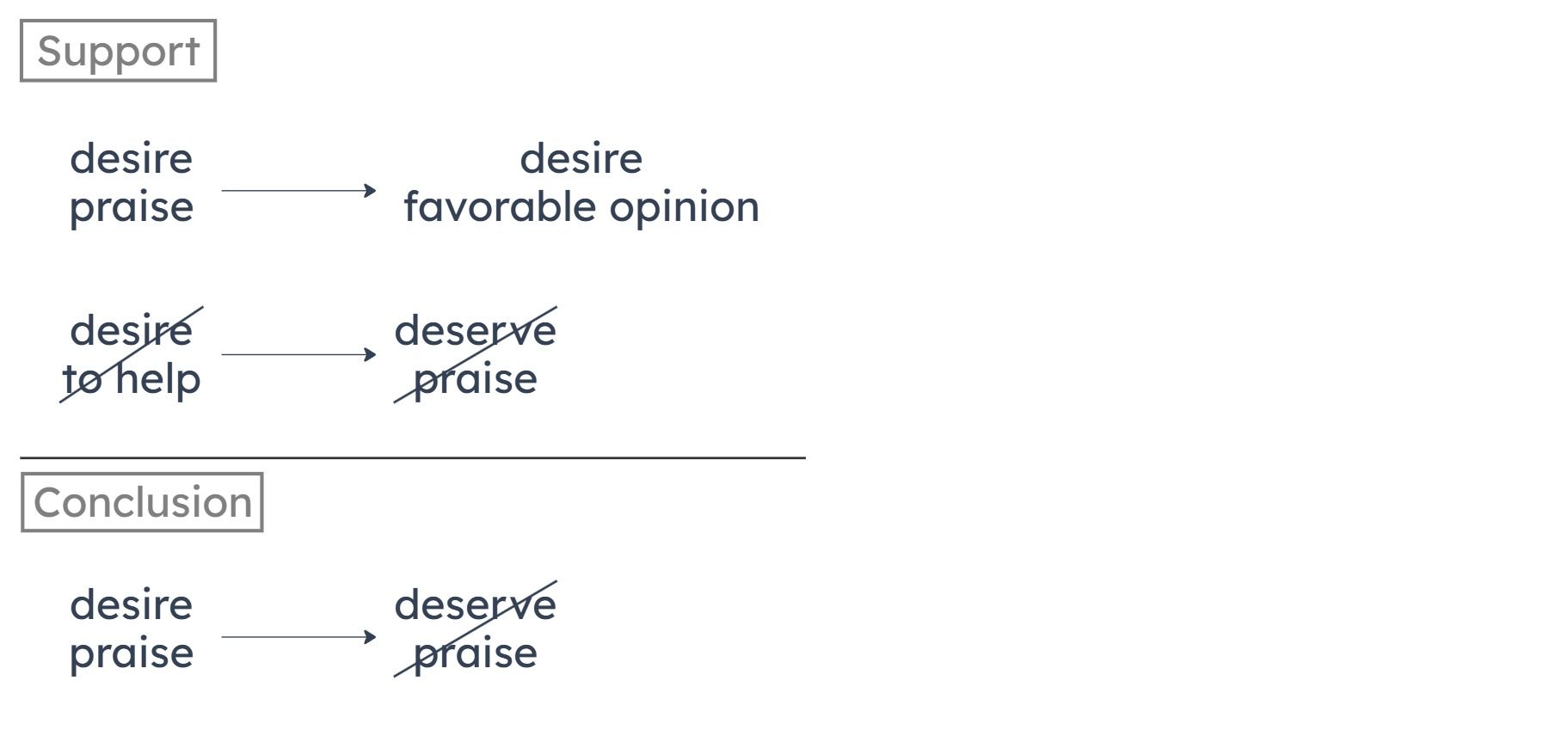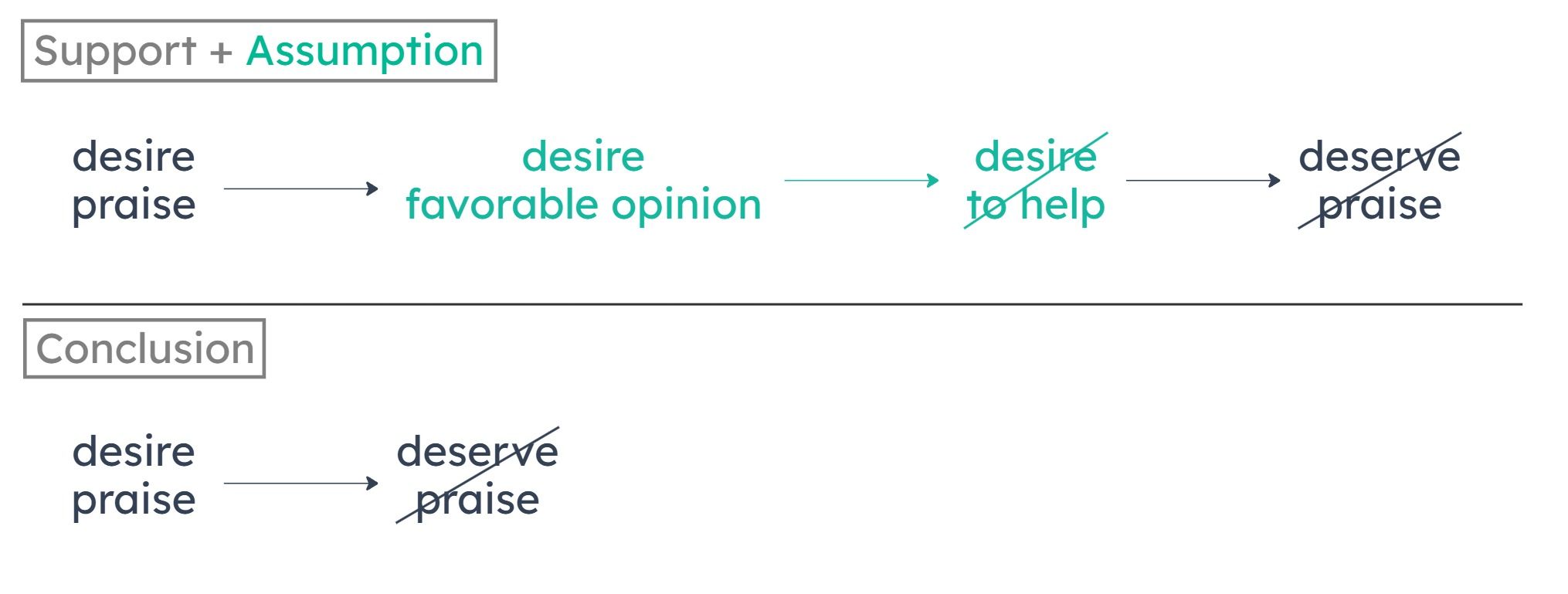Summarize Argument
The author concludes that the critics who accuse our team of being unprofessional due to the team’s enthusiasm on the field are wrong. This is based on the fact that the professionals in the sport act in a more enthuasiastic way.
Identify and Describe Flaw
The author misinterprets the critics claim that the team is “unprofessional.” “Unprofessional” can mean rude, uncourteous. But the author mistakenly thinks that the critics were claiming the team was not behaving like professional players behave.
A
misleadingly equates enthusiasm with unethical play
The author does not equate enthusiasm with unethical play. Rather, he is responding to the critics’ belief that the enthusiastic repsonses of the team are “unprofessional.” The author believes the responses are not “unprofessional,” in the sense that professionals act similarly.
B
misinterprets the critics’ claim that the team is unprofessional
The author misinterprets the critics’ claim as accusing the team of not acting like professional players. But the critics actually just mean that the team is rude or uncourteous.
C
too quickly generalizes from the sport at one level to the sport at a different level
The author doesn’t try to conclude that something is true of nonprofessionals because it’s true of professionals. The author is trying to show that particular behavior is performed by professionals to rebut the claim that the team is “unprofessional.”
D
shifts the blame for the team’s behavior to professional players
The author does not try to cast blame on anyone. Rather, the author tries to rebut the claim that the team is “unprofessional.”
E
takes everyone on the team to have performed the actions of a few
The author does not assume that everyone on the team acted in a certain way because a few acted in that way. The premises don’t say anything about whether only a few individuals have acted enthusiastically.
Summarize Argument: Phenomenon-Hypothesis
The author hypothesizes that the comet theory is a plausible explanation of the dinosaurs’ extinction. This is based on the idea that a collision of a large enough comet into the Earth could have caused a dust cloud that could have cooled the climate long enough to cause the extinction of the dinosaurs.
Notable Assumptions
The author assumes that a large enough comet existed and could have collided with Earth at the time in question. He also assumes that the impact would cause a dust cloud that would cover the planet, and that this would cool the climate long enough to lead to the dinosaurs’ extinction. (The author says that these events “could” happen––we don’t know their likelihood. It could be a very slim possibility.) The author assumes that, even if these events occurred, the cooling caused by the comet is what led to the dinosaurs’ extinction.
A
One of the various schools of paleontology adheres to an explanation for the disappearance of the dinosaurs that is significantly different from the comet theory.
The author is only arguing that the comet theory is plausible; the fact that other theories differ from the comet theory doesn’t weaken the argument. It doesn’t weaken our argument that other plausible explanations may exist.
B
Various species of animals from the same era as the dinosaurs and similar to them in physiology and habitat did not become extinct when the dinosaurs did.
(B) suggests that the extinction of the dinosaurs was driven by some factor that differentiated dinosaurs from other animals with similar habitat and climate needs. If the comet theory was true, animals with similar physiology and habitat to dinosaurs would have gone extinct too.
C
It cannot be determined from a study of dinosaur skeletons whether the animals died from the effects of a dust cloud.
(C) just says that one specific kind of evidence cannot be used. The inability to use skeletons as evidence does not weaken the argument that the comet theory is plausible. (C) makes the inappropriate assumption that skeletons are the only source of information available.
D
Many other animal species from the era of the dinosaurs did not become extinct at the same time the dinosaurs did.
(D) is too broad. The animal species referenced in (D) could have had vastly different requirements for habitat and climate. It makes sense that some animals survived the incident that killed the dinosaurs.
E
The consequences for vegetation and animals of a comet colliding with Earth are not fully understood.
The argument that the comet theory is plausible doesn’t require a full understanding of the impacts of a comet collision on plants and animals, so (E) does not impact the argument.
Summary
The author concludes that people who help others mainly out of a desire for praise do not deserve praise for that help. This is based on the following:
The desire for praise is the desire to obtain the favorable opinions of others.
If someone deserves praise for an action (”merit” = “deserve”), that action must be motivated by a desire to help others.
The desire for praise is the desire to obtain the favorable opinions of others.
If someone deserves praise for an action (”merit” = “deserve”), that action must be motivated by a desire to help others.

Missing Connection
We’re trying to prove that people who help others mainly out of a desire for praise don’t deserve praise for that help. We know from the second premise that in order to deserve praise, the action must be motivated by a desire to help others. So if we can show that people who help others mainly out of a desire for praise are NOT motivated by a desire to help others, that would prove our conclusion.
A
An action that is motivated by a desire for the favorable opinion of others cannot also be motivated by a desire to help others.
The first premise establishes that the desire for praise is the desire to obtain the favorable opinions of others. (A) would establish that helping others mainly out of the desire for praise constitutes an action that is NOT motivated by a desire to help others. This then would connect with the second premise, which takes us to “not deserve praise.”

B
No action is worthy of praise if it is motivated solely by a desire for praise.
The conclusion concerns people who help others “primarily” out of a desire for praise. (B), which tells us that actions motivated “solely” by praise don’t deserve praise, doesn’t cover actions that are done “primarily” out of desire for praise.
C
People who are indifferent to the welfare of others do not deserve praise.
We don’t know that people who help others primarily out of a desire for praise are indifferent to the welfare of others. Maybe they do care about others...it’s just that their action is mainly about getting praise.
D
One deserves praise for advancing one’s own interests only if one also advances the interests of others.
It’s not clear that one who helps others out of a desire for praise is actually advancing their own interests. It’s also not clear that helping others out of a desire for praise wouldn’t advance the interests of others. So (D) doesn’t connect to any of the premises of this argument.
E
It is the motives rather than the consequences of one’s actions that determine whether one deserves praise for them.
(E) establishes that motives determine whether one deserve praise. But (E) allows for actions out of selfish motives, such as desire for praise, to still deserve praise. (E) doesn’t tell us what kind of motive would make an action undeserving of praise.
Summarize Argument
The author’s main conclusion is that the proposal to stimulate economic activity in the province by refunding $600 million won’t actually benefit the province’s taxpayers. This is because the province’s budget is required to be in balance, which the author believes implies that the province will need to issue new taxes or fire workers in order to make up for the $600 million that would be going back to taxpayers.
Notable Assumptions
The author assumes that in order to balance the budget, the province must issue new taxes or fire workers.
A
taxpayers of the province would spend outside the province at least $300 million of any $600 million refunded to them
If taxpayers spend the refund out of province, that’s less money that would be spent on economic activity in the province. This supports the author’s point that the proposal won’t result in a net increase in spending in the province.
B
taxpayers of the province would receive any refund in partial payments during the year rather than in a lump sum
Whether the refund is in one lump sum or multiple payments doesn’t change the overall amount of the refund or whether the need to balance the budget necessitates new taxes or firing workers.
C
province could assess new taxes in a way that would avoid angering taxpayers
The taxpayers’ emotions have no clear impact on this argument. The author’s reasoning relates to the need to balance the budget and recoup the $600 million being refunded.
D
province could, instead of refunding the money, stimulate its economy by redirecting its spending to use the $600 million for construction projects creating jobs around the province
This answer describes a solution that doesn’t involve refunding $600 million to taxpayers. But the conclusion is about the refund and whether it will achieve its goal. Pointing out that we can do something besides a refund doesn’t undermine the author’s point.
E
province could keep its workers and use them more effectively, with a resulting savings of $600 million in its out-of-province expenditures
This points out how the need to balance the budget doesn’t require new taxes or firing workers. If we could keep workers and recoup $600 million by saving on out-of-province expenditures, then we don’t need to tax the province’s taxpayers or fire workers.